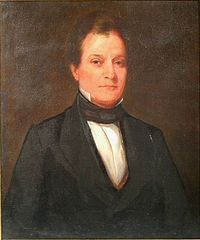William B. Campbell
| William B. Campbell | |
|---|---|

Portrait of Campbell by Washington B. Cooper
|
|
| 14th Governor of Tennessee | |
|
In office October 16, 1851 – October 17, 1853 |
|
| Preceded by | William Trousdale |
| Succeeded by | Andrew Johnson |
| Member of the U.S. House of Representatives from Tennessee's 6th district |
|
|
In office March 4, 1837 – March 3, 1843 |
|
| Preceded by | Balie Peyton |
| Succeeded by | Aaron V. Brown |
| Member of the U.S. House of Representatives from Tennessee's 5th district |
|
|
In office July 24, 1866 – March 3, 1867 |
|
| Preceded by | Robert H. Hatton |
| Succeeded by | John Trimble |
| Personal details | |
| Born |
February 1, 1807 Sumner County, Tennessee |
| Died | August 19, 1867 (aged 60) Lebanon, Tennessee |
| Resting place |
Cedar Grove Cemetery Lebanon, Tennessee |
| Political party | Whig |
| Spouse(s) | Frances Owen |
| Profession | Attorney |
| Religion | Methodist |
| Military service | |
| Service/branch | Tennessee Militia United States Army |
| Years of service | 1836–1837 1846–1847 1862 |
| Rank |
|
| Commands | 1st Regiment Tennessee Volunteers |
| Battles/wars |
Second Seminole War Mexican-American War • Monterrey (1846) • Veracruz (1847) • Cerro Gordo (1847) American Civil War |
William Bowen Campbell (February 1, 1807 – August 19, 1867) was an American politician and soldier. He served as Governor of Tennessee from 1851 to 1853, and was the state's last Whig governor. He also served four terms in the United States House of Representatives, from 1837 to 1843, and from 1866 to 1867.
During the Mexican-American War, Campbell commanded the First Regiment Tennessee Volunteers, known as the "Bloody First" for its high casualty rate. At the outbreak of the American Civil War, Campbell opposed secession, and briefly served as a general in the Union Army.
Campbell was born on Mansker's Creek in Sumner County, Tennessee, to David and Catherine Bowen Campbell. He studied law at Abingdon, Virginia, with his father's cousin, Virginia Governor David Campbell, and attended lectures at Winchester Law School. He returned to Tennessee in 1829 in order to establish a law practice at Carthage, in Smith County. He was admitted to the bar in 1830. In 1831, he was appointed attorney general for a state circuit, and moved to Sparta, Tennessee.
In 1835, Campbell moved back to Carthage, and was elected to Smith County's seat in the Tennessee House of Representatives. He resigned his seat in 1836, however, in order to fight in the Second Seminole War. He served as a captain under Colonel William Trousdale.
...
Wikipedia
